人教版(2019)选择性必修第三册 Unit4 Adversity and Courage易混易错点辨析学案(有答案)
文档属性
| 名称 | 人教版(2019)选择性必修第三册 Unit4 Adversity and Courage易混易错点辨析学案(有答案) | 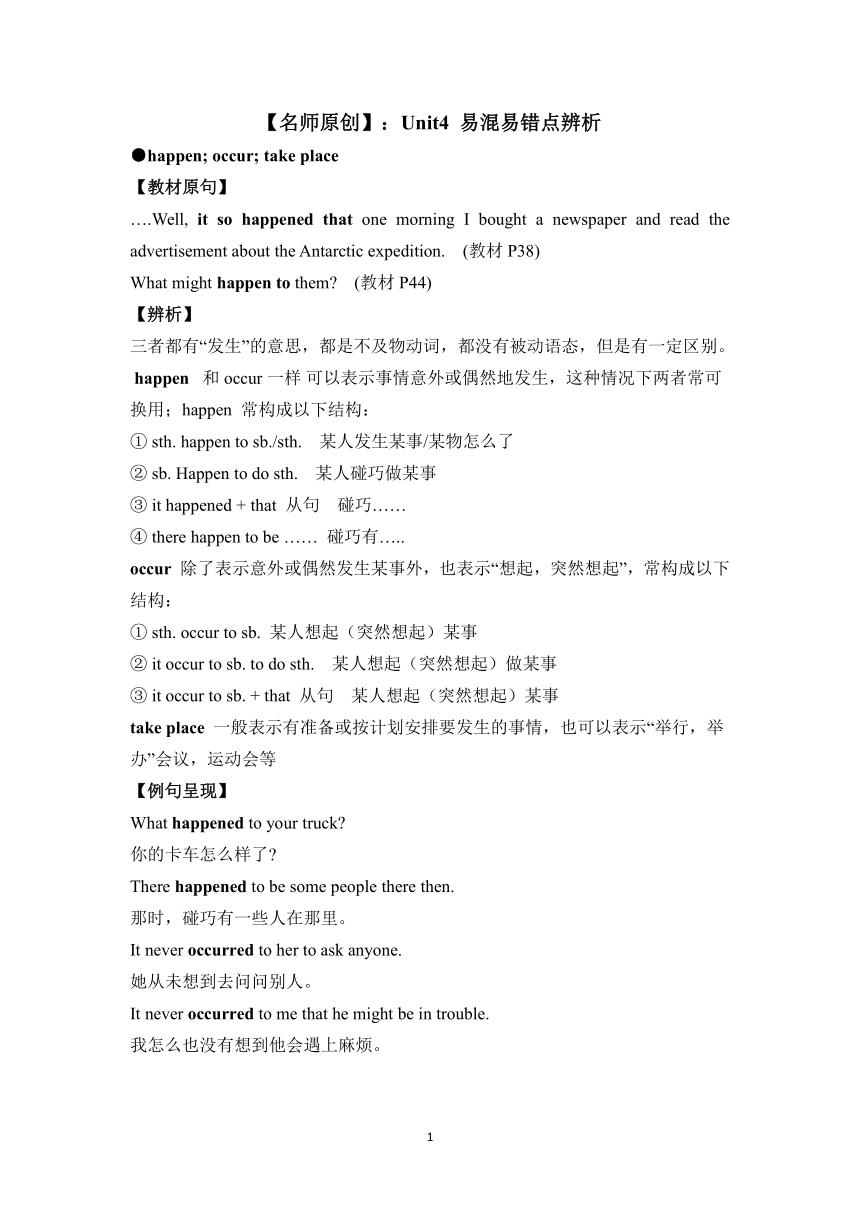 | |
| 格式 | doc | ||
| 文件大小 | 85.0KB | ||
| 资源类型 | 教案 | ||
| 版本资源 | 人教版(2019) | ||
| 科目 | 英语 | ||
| 更新时间 | 2023-03-14 12:44:34 | ||
图片预览

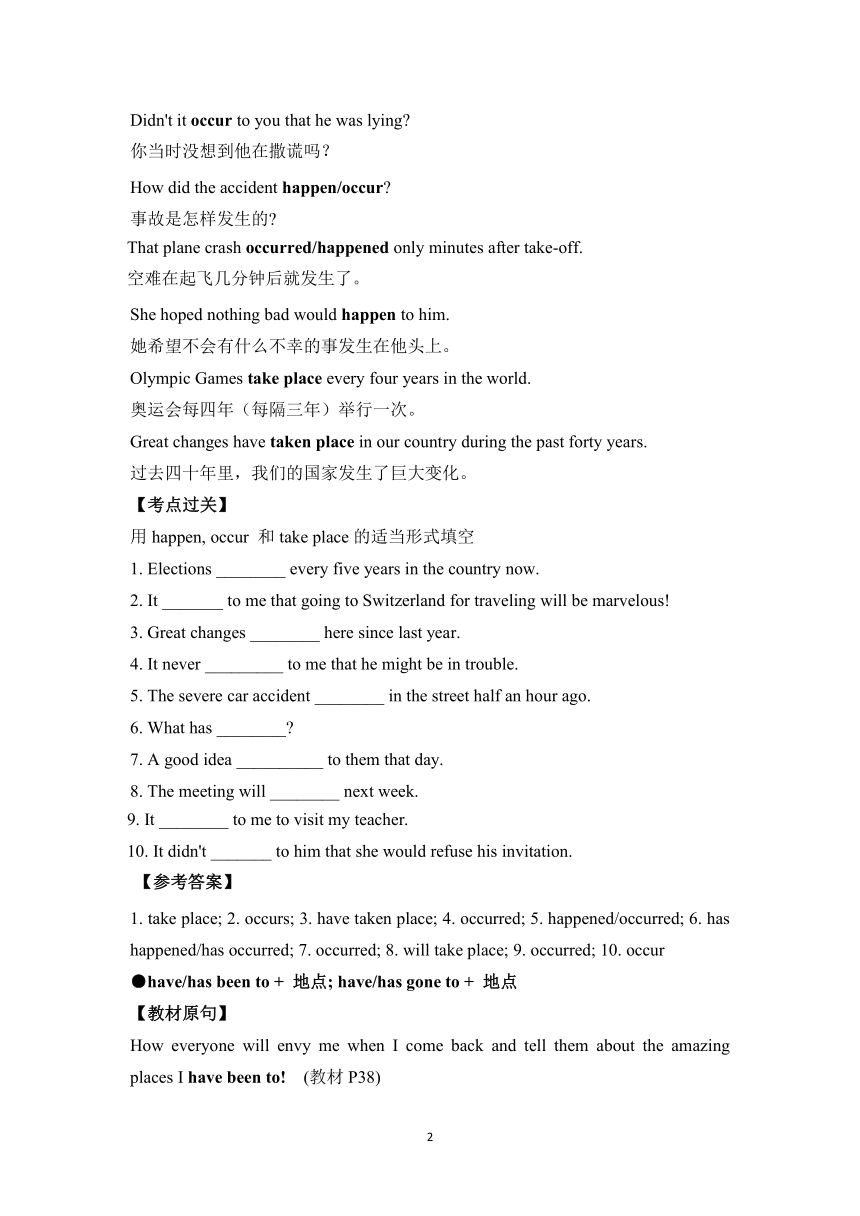
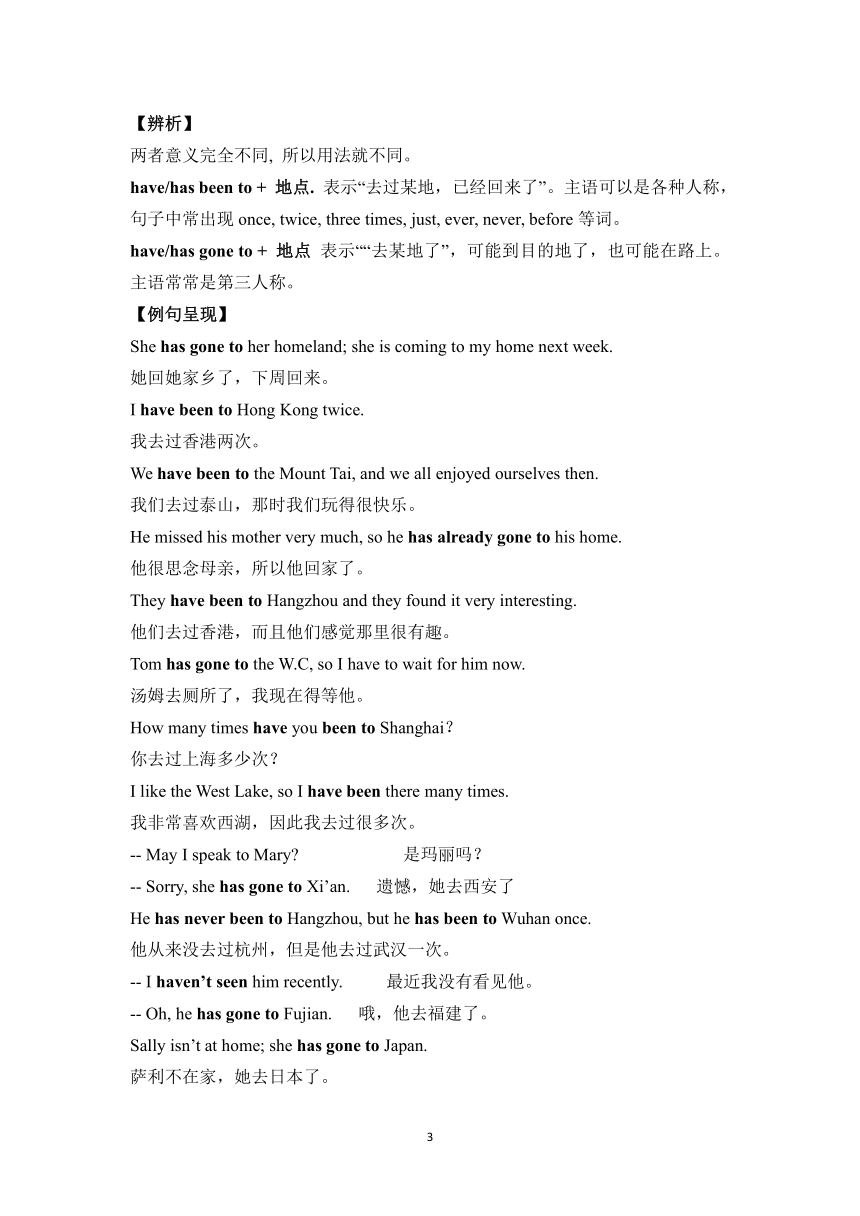
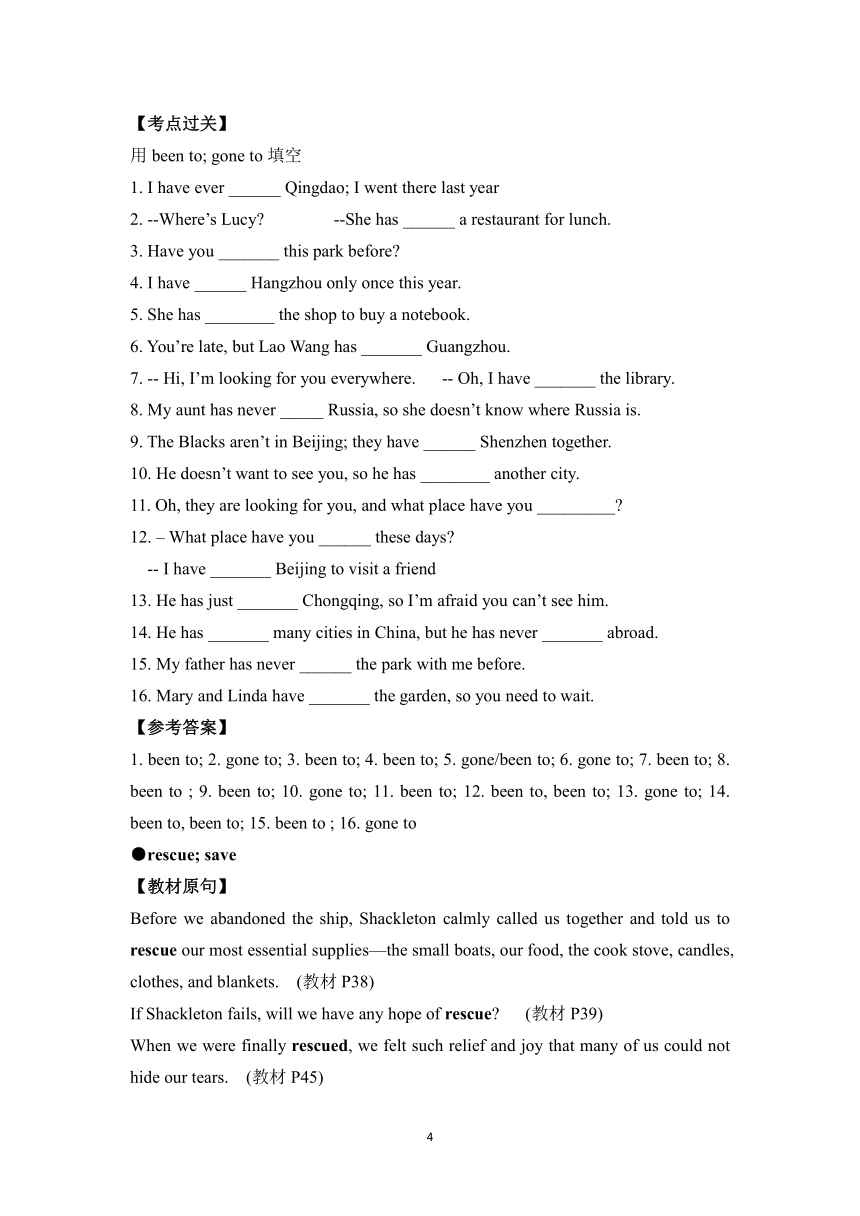
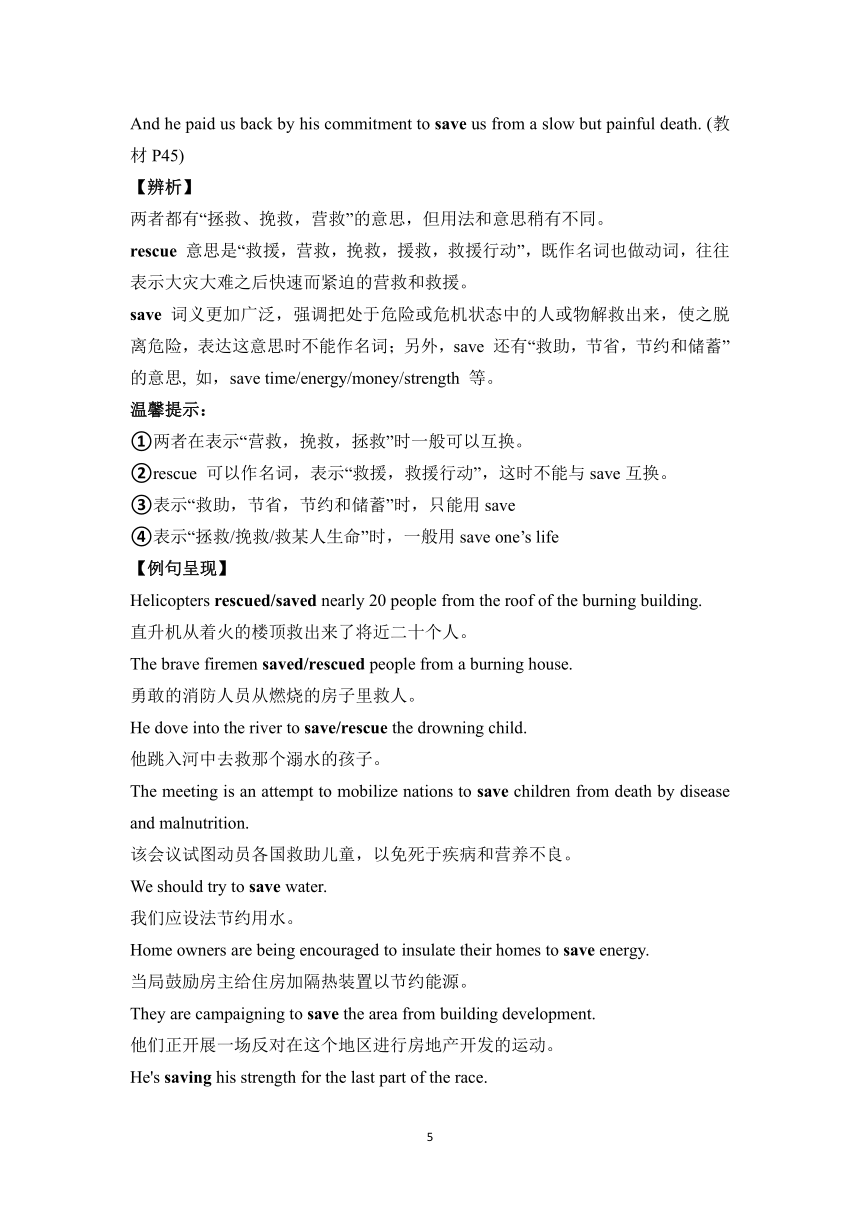
文档简介
【名师原创】:Unit4 易混易错点辨析
●happen; occur; take place
【教材原句】
….Well, it so happened that one morning I bought a newspaper and read the advertisement about the Antarctic expedition. (教材P38)
What might happen to them (教材P44)
【辨析】
三者都有“发生”的意思,都是不及物动词,都没有被动语态,但是有一定区别。
happen 和occur一样 可以表示事情意外或偶然地发生,这种情况下两者常可换用;happen 常构成以下结构:
① sth. happen to sb./sth. 某人发生某事/某物怎么了
② sb. Happen to do sth. 某人碰巧做某事
③ it happened + that 从句 碰巧……
④ there happen to be …… 碰巧有…..
occur 除了表示意外或偶然发生某事外,也表示“想起,突然想起”,常构成以下结构:
① sth. occur to sb. 某人想起(突然想起)某事
② it occur to sb. to do sth. 某人想起(突然想起)做某事
③ it occur to sb. + that 从句 某人想起(突然想起)某事
take place 一般表示有准备或按计划安排要发生的事情,也可以表示“举行,举办”会议,运动会等
【例句呈现】
What happened to your truck
你的卡车怎么样了
There happened to be some people there then.
那时,碰巧有一些人在那里。
It never occurred to her to ask anyone.
她从未想到去问问别人。
It never occurred to me that he might be in trouble.
我怎么也没有想到他会遇上麻烦。
Didn't it occur to you that he was lying
你当时没想到他在撒谎吗?
How did the accident happen/occur
事故是怎样发生的
That plane crash occurred/happened only minutes after take-off.
空难在起飞几分钟后就发生了。
She hoped nothing bad would happen to him.
她希望不会有什么不幸的事发生在他头上。
Olympic Games take place every four years in the world.
奥运会每四年(每隔三年)举行一次。
Great changes have taken place in our country during the past forty years.
过去四十年里,我们的国家发生了巨大变化。
【考点过关】
用happen, occur 和take place的适当形式填空
1. Elections ________ every five years in the country now.
2. It _______ to me that going to Switzerland for traveling will be marvelous!
3. Great changes ________ here since last year.
4. It never _________ to me that he might be in trouble.
5. The severe car accident ________ in the street half an hour ago.
6. What has ________
7. A good idea __________ to them that day.
8. The meeting will ________ next week.
9. It ________ to me to visit my teacher.
10. It didn't _______ to him that she would refuse his invitation.
【参考答案】
1. take place; 2. occurs; 3. have taken place; 4. occurred; 5. happened/occurred; 6. has happened/has occurred; 7. occurred; 8. will take place; 9. occurred; 10. occur
●have/has been to + 地点; have/has gone to + 地点
【教材原句】
How everyone will envy me when I come back and tell them about the amazing places I have been to! (教材P38)
【辨析】
两者意义完全不同, 所以用法就不同。
have/has been to + 地点. 表示“去过某地,已经回来了”。主语可以是各种人称,句子中常出现once, twice, three times, just, ever, never, before等词。
have/has gone to + 地点 表示““去某地了”,可能到目的地了,也可能在路上。主语常常是第三人称。
【例句呈现】
She has gone to her homeland; she is coming to my home next week.
她回她家乡了,下周回来。
I have been to Hong Kong twice.
我去过香港两次。
We have been to the Mount Tai, and we all enjoyed ourselves then.
我们去过泰山,那时我们玩得很快乐。
He missed his mother very much, so he has already gone to his home.
他很思念母亲,所以他回家了。
They have been to Hangzhou and they found it very interesting.
他们去过香港,而且他们感觉那里很有趣。
Tom has gone to the W.C, so I have to wait for him now.
汤姆去厕所了,我现在得等他。
How many times have you been to Shanghai?
你去过上海多少次?
I like the West Lake, so I have been there many times.
我非常喜欢西湖,因此我去过很多次。
-- May I speak to Mary 是玛丽吗?
-- Sorry, she has gone to Xi’an. 遗憾,她去西安了
He has never been to Hangzhou, but he has been to Wuhan once.
他从来没去过杭州,但是他去过武汉一次。
-- I haven’t seen him recently. 最近我没有看见他。
-- Oh, he has gone to Fujian. 哦,他去福建了。
Sally isn’t at home; she has gone to Japan.
萨利不在家,她去日本了。
【考点过关】
用been to; gone to填空
1. I have ever ______ Qingdao; I went there last year
2. --Where’s Lucy --She has ______ a restaurant for lunch.
3. Have you _______ this park before
4. I have ______ Hangzhou only once this year.
5. She has ________ the shop to buy a notebook.
6. You’re late, but Lao Wang has _______ Guangzhou.
7. -- Hi, I’m looking for you everywhere. -- Oh, I have _______ the library.
8. My aunt has never _____ Russia, so she doesn’t know where Russia is.
9. The Blacks aren’t in Beijing; they have ______ Shenzhen together.
10. He doesn’t want to see you, so he has ________ another city.
11. Oh, they are looking for you, and what place have you _________
12. – What place have you ______ these days
-- I have _______ Beijing to visit a friend
13. He has just _______ Chongqing, so I’m afraid you can’t see him.
14. He has _______ many cities in China, but he has never _______ abroad.
15. My father has never ______ the park with me before.
16. Mary and Linda have _______ the garden, so you need to wait.
【参考答案】
1. been to; 2. gone to; 3. been to; 4. been to; 5. gone/been to; 6. gone to; 7. been to; 8. been to ; 9. been to; 10. gone to; 11. been to; 12. been to, been to; 13. gone to; 14. been to, been to; 15. been to ; 16. gone to
●rescue; save
【教材原句】
Before we abandoned the ship, Shackleton calmly called us together and told us to rescue our most essential supplies—the small boats, our food, the cook stove, candles, clothes, and blankets. (教材P38)
If Shackleton fails, will we have any hope of rescue (教材P39)
When we were finally rescued, we felt such relief and joy that many of us could not hide our tears. (教材P45)
And he paid us back by his commitment to save us from a slow but painful death. (教材P45)
【辨析】
两者都有“拯救、挽救,营救”的意思,但用法和意思稍有不同。
rescue 意思是“救援,营救,挽救,援救,救援行动”,既作名词也做动词,往往表示大灾大难之后快速而紧迫的营救和救援。
save 词义更加广泛,强调把处于危险或危机状态中的人或物解救出来,使之脱离危险,表达这意思时不能作名词;另外,save 还有“救助,节省,节约和储蓄”的意思, 如,save time/energy/money/strength 等。
温馨提示:
①两者在表示“营救,挽救,拯救”时一般可以互换。
②rescue 可以作名词,表示“救援,救援行动”,这时不能与save互换。
③表示“救助,节省,节约和储蓄”时,只能用save
④表示“拯救/挽救/救某人生命”时,一般用save one’s life
【例句呈现】
Helicopters rescued/saved nearly 20 people from the roof of the burning building.
直升机从着火的楼顶救出来了将近二十个人。
The brave firemen saved/rescued people from a burning house.
勇敢的消防人员从燃烧的房子里救人。
He dove into the river to save/rescue the drowning child.
他跳入河中去救那个溺水的孩子。
The meeting is an attempt to mobilize nations to save children from death by disease and malnutrition.
该会议试图动员各国救助儿童,以免死于疾病和营养不良。
We should try to save water.
我们应设法节约用水。
Home owners are being encouraged to insulate their homes to save energy.
当局鼓励房主给住房加隔热装置以节约能源。
They are campaigning to save the area from building development.
他们正开展一场反对在这个地区进行房地产开发的运动。
He's saving his strength for the last part of the race.
他保存体力,以便在比赛的最后阶段发力。
She needs to win the next two games to save the match.
只有下面的两场获胜,她才能挽回败局。
Consumption rather than saving has become the central feature of contemporary societies.
现代社会的主要特征是消费而不是储蓄。
A helicopter was scrambled to help rescue/save three young climbers.
直升机接到命令,紧急起飞前去营救三个登山的年轻人。
Every type of boat was pressed into service to rescue/save passengers from the sinking ferry.
为了营救下沉渡轮上的旅客,各类船只都被临时征用了。
The strain was beginning to tell on the rescue team.
过度的疲劳开始让救援队吃不消了。
People rushed to her rescue and picked her up.
人们冲上来把她救起。
【考点过关】
用save, rescue 的适当形式填空
1. We_________ up to go to Australia for several months.
2. If we go this way it will ______ us two hours on the trip.
3. Doctors fought for more than six hours to _______ his life.
4. So far we _______ enough money to pay for the house.
5. Two children _______ from the burning car.
6. The ______ helicopter made another sweep over the bay.
7. _______ teams are using thermal imaging to locate survivors of the earthquake.
8. _______ planes are trying to locate the missing sailors.
9. Volunteers formed a human chain ________ precious items from the burning house.
10. With the help of a ladder, neighbors were able to _______ the children from the blaze.
11. The exhausted climbers _______ by helicopter.
12. The bank stepped in _______ the company from financial ruin.
【参考答案】
1. have been saving; 2. save ; 3. save; 4. have saved; 5. were rescued/saved; 6. rescue; 7. Rescue; 8. Rescue; 9. to save/rescue; 10. rescue/save; 11. were rescued/saved; 12. to save/recue
●clothes; cloth; clothing
【教材原句】
Before we abandoned the ship, Shackleton calmly called us together and told us to rescue our most essential supplies—the small boats, our food, the cook stove, candles, clothes, and blankets. (教材P38)
I try to think of happier things: decent food, warm and dry clothes, a cosy bedroom, sunny days, and my mother’s face….. (教材P39)
It was almost as dangerous to become too hot from wearing too many clothes as to become too cold from wearing too few. (教材P44)
【辨析】
中这三者都与衣服有关,词形上也很相似
clothes 表示的衣服包括上衣、裤子、外衣等各部分,永远是复数形式。
温馨提示:
①clothes前不能用数词修饰,但可以用形容词性物主代词my, their, his, her, our, your、指示代词these, those和不定代词many,a few, several, some等词修饰。
正:those clothes / few clothes / many clothes
误:a clothes / two clothes / three clothes
② clothes单独做主语时,谓语动词须用复数形式; 但a suit of clothes(一套衣 服)做主语时,谓语动词用单数形式。
③clothes可受某些名词修饰,表示不同用途的衣服,如:school clothes(校服),sports clothes(运动服),work clothes(工作服),play clothes(休闲服)等;表示不同季节穿的服装,如spring clothes(春装)、summer clothes(夏装)、autumn clothes(秋装)、winter clothes(冬装);还有men’s clothes(男装),women’s clothes(女装),children’s clothes(童装)等,但是“婴儿服装”是baby clothes,通常不说babies’ clothes。
④表示一套衣服,可以借助suit或set,如:a suit of clothes(一套衣服);two suits of clothes(二套衣服)等。
cloth指做衣服等用的材料,如布料,毛料、丝绸等,是物质名词,不可数,不能和不定冠词a连用, 表示“一块布料”是:a piece of cloth/an article of cloth/an item of cloth,类似的表达还有:
Three pieces/articles/items of cloth 三块布;three yards of cloth 3码布;a roll of cloth 一卷布。
温馨提示:
当cloth和某些名词构成复合名词时,指有特殊用途的一块布,是可数名词。如: a dustcloth/a dust cloth 一块抹布;a tablecloth/a table cloth 一块桌布;
a dishcloth/a dish cloth 一块洗碗布;a face cloth 一块洗脸毛巾。以上这种情况时,可以根据上下文语境简称为a cloth.
clothing表示“衣服”的总称,是一个不可数的集合名词, 永远用单数形式。
温馨提示:
①如果要表示“一件衣服”,可借助单位词article, item或piece, 即: an article of clothing/an item of clothing/a piece of clothing;
三件衣服: three pieces /items/articles of clothing
②汉语说中的“衣食”,在英语中通常表达为food and clothing。
③习语a wolf in sheep’s clothing的意思是“披着羊皮的狼”,其中的clothing习惯用法,一般不可能换成clothes。
【例句呈现】
This kind of cloth wears well.
这种布料很耐穿的。
Can you see any difference between these two pieces of cloth
你能看出这两块布料的不同吗
They handed each of us a hot wet cloth to wipe our hands.
他递给我们每人一块温热的湿布擦手。
The box was covered with a black cloth by the magician.
盒子被魔术师盖上黑布。
Your clothes are in the bedside table.
你的衣服在床头柜里。
Please send these clothes to the laundry.
请把这些衣服送到洗衣 店去。
There was a suit of clothes on his bed.
他的床上有一套衣服。
He had to buy a good many clothes.
他得买很多衣服。
This shop sells children's clothing.
这家商店出售童装。
They provided the refugees with food and clothing.
他们向难民提供食品和衣物。
No matter where we are, we always have food, clothing, and shelter us as well as people who love us.
无论身在何处,我们都能得到衣食和庇护,还有关爱我们的人。
We need warm clothing for the winter.
我们需要暖和的衣服过冬。
【考点过关】
1. I found an article of ________ in his office.
2. Where did he get his ________ made?
3. What do you think of this suit of ________
4. She bought some ________ to make some new dresses.
5. The ________ feels smooth and soft.
6. Pass me a table ________, please.
7. Those curtain ________ need washing.
8. Our ________ protects us from the cold.
9. We have enough food and _____________ for the winter.
10. She’s got many beautiful ____________.
11. _________ can be made from any kind of ________ including wool and cotton.
12. How much _______ will I need to make a pair of trousers
13. She often wears beautiful _________.
14. You should give all the old ________ away.
【参考答案】
1. clothing; 2. clothes ; 3. clothes; 4. cloth; 5. cloth ; 6. cloth ; 7. cloths ; 8. clothing ; 9. clothing ; 10. clothes ;11. Clothing ; cloth ; 12. cloth ;13. clothes ;14. clothing
●manage to do sth. ; try to do sth.
【教材原句】
We are now camped on the ice and we have been managing to survive, but spring is coming, and the ice will soon begin to melt. (教材P38)
As a chef, it was my duty to cook, so I tried to vary the meals in whatever way I could. (教材P44)
【辨析】
两个词组都可表示“设法做”之意,均可接动词不定式作宾语。但表示的含义有区别。
manage to do sth. “设法做成某事”,强调所做事情的结果,相当于succeed in doing sth. 或be successful in doing sth.
try to do sth. “努力/试图/设法做某事”,但未必一定会能成功,只强调努力的过程,对其结果无限制, 所做之事不一定有困难, 相当于try/do one’s best to do sth.
【例句呈现】
I am trying to finish my homework.
我正努力完成我的家庭作业。
I try not to convince myself that she doesn't love me anymore.
我尽量不让自己相信她不再爱我了。
He didn’t try to do it.
他不肯努力去干
please try to finish this work in thirty minutes.
请尽量在30分钟完成这项工作。
I managed to get in contact with the lady, who’s in charge of this project in the company.
我成功地同那家公司负责这个项目的女士取得了联系。
He managed to save her in time.
他设法及时挽救了她.
He tried to open the box with a knife.
他试图用刀子打开箱子。
Time given to us defines how long we will stay with our families, how many good things we will manage to do, and how much interesting things we will see and learn.
时间决定了我们能与家人厮守多久,我们能完成多少美妙的事情,以及我们能看到听到多少有趣的事情。
It should be possible for most people to manage to do it.
大多数人应该都能做到。
【考点过关】
用 manage, try或其适当形式填空
1. He ______ to climb the tree, but he could not.
2. If you don't ______ to do everything, it doesn't matter. Move any incomplete tasks from today onto tomorrow's list.
3. I see what you mean, but if you _______to do it, you won’t regret.
4. Fantastic! Ho does Beijing Municipal Government ______ to do it
5. How did you _______to do it without help
6. How on earth did they _______ to do that
7. If you can ________ to do all three, you'll raise your intelligence by leaps and bounds.
8. How do you ________ to do such a thing
9. I feel the same way. But if we insist on speaking, we can _______ to do it.
10. Although you may fail, when you start to race for a new team, you ______to be successful as soon as possible.
【参考答案】
1. tried; 2. manage; 3. try; 4. manage; 5. manage; 6. manage; 7. manage; 8. manage; 9. manage; 10. try
●interrupt;disturb
【教材原句】
However, these happy memories are soon interrupted by a sudden cold rush of air. (教材P39)
【辨析】
两者都有“打扰”的意思,偶尔可互换,但是在意义上有很大区别。
interrupt 意思是“插嘴;打扰;打岔;使暂停;使中断;阻断,遮挡;打断(某人)”,强调客观上打断或打断别人的交谈,或者是正在进行的事情。
disturb意思是“打扰;干扰;妨碍;搅乱;弄乱;搞乱;使焦虑;使不安;使烦恼;扰乱治安”,侧重指别人在专心做某件事情,或者是在休息的时候,去打扰了对方,引起对方反感,从而使人产生精神层面的烦恼或焦虑。
【例句呈现】
Too many examples can interrupt the smooth flow of the text.
例子太多会使行文不流畅。
I can't stand people interrupting all the time.
我不能容忍老有人打岔。
Would you mind not interrupting all the time
请你别老是插嘴好吗?
The game was interrupted several times by rain.
比赛因下雨中断了几次。
Sorry to interrupt, but there's someone to see you.
对不起打扰一下,有人要见你。
We interrupt this program to bring you an important news bulletin.
我们暂停本节目,插播重要新闻。
You've interrupted my flow ─ I can't remember what I was saying.
你打断了我的话——我记不得我在说什么了。
If you get up early, try not to disturb everyone else.
如果你起得早,尽量不要打扰别人。
He knew an intimate little bar where they would not be disturbed.
他知道一处适合幽会的小酒吧,他们在那里不会受到打扰。
His wife's death disturbed the balance of his mind.
妻子的离世使他心神不宁。
She was in a disturbed state of mind.
她的脑子里一片混乱。
It disturbed her to realize that she was alone.
她意识到自己孤单一人,心里感到很不安。
Tourists often disturb the delicate balance of nature on the island.
观光客常常破坏岛上微妙的自然生态平衡。
I didn't like to disturb you.
我本不愿打搅你。
【考点训练】
用interrupt和disturb的适当形式填空
1. When we were talking, he often _______ the conversation.
2. Don’t _______ her because she is very busy.
3. His speech was constantly _______ by applause.
4. I'll see my patient now and we expect not to ________.
5. I was just going to tell you when you _______.
6. It is not polite ________ when someone is talking.
7. Please continue ─ I didn't mean _______.
8. Don’t ________ me while I am writing.
9. The phone ringing ________ my train of thought.
10. My sister always _______ me when I study.
11. Forgive my ________ but I really don't agree with that.
12. Please do not ________ us when we are working.
13. He jacked in the earphone so that he would not _______ others.
14. The manager will be angry if you ______ him when he's in conference.
15. It will ________ your normal mind.
【参考答案】
1. interrupted; 2. disturb; 3. interrupted; 4. be disturbed; 5. interrupted; 6. to interrupt; 7. to interrupt; 8. interrupt/disturb; 9. Interrupted; 10. disturbs; 11. interrupting; 12. interrupt/disturb; 13. disturb; 14. disturb; 15. disturb
PAGE
13
●happen; occur; take place
【教材原句】
….Well, it so happened that one morning I bought a newspaper and read the advertisement about the Antarctic expedition. (教材P38)
What might happen to them (教材P44)
【辨析】
三者都有“发生”的意思,都是不及物动词,都没有被动语态,但是有一定区别。
happen 和occur一样 可以表示事情意外或偶然地发生,这种情况下两者常可换用;happen 常构成以下结构:
① sth. happen to sb./sth. 某人发生某事/某物怎么了
② sb. Happen to do sth. 某人碰巧做某事
③ it happened + that 从句 碰巧……
④ there happen to be …… 碰巧有…..
occur 除了表示意外或偶然发生某事外,也表示“想起,突然想起”,常构成以下结构:
① sth. occur to sb. 某人想起(突然想起)某事
② it occur to sb. to do sth. 某人想起(突然想起)做某事
③ it occur to sb. + that 从句 某人想起(突然想起)某事
take place 一般表示有准备或按计划安排要发生的事情,也可以表示“举行,举办”会议,运动会等
【例句呈现】
What happened to your truck
你的卡车怎么样了
There happened to be some people there then.
那时,碰巧有一些人在那里。
It never occurred to her to ask anyone.
她从未想到去问问别人。
It never occurred to me that he might be in trouble.
我怎么也没有想到他会遇上麻烦。
Didn't it occur to you that he was lying
你当时没想到他在撒谎吗?
How did the accident happen/occur
事故是怎样发生的
That plane crash occurred/happened only minutes after take-off.
空难在起飞几分钟后就发生了。
She hoped nothing bad would happen to him.
她希望不会有什么不幸的事发生在他头上。
Olympic Games take place every four years in the world.
奥运会每四年(每隔三年)举行一次。
Great changes have taken place in our country during the past forty years.
过去四十年里,我们的国家发生了巨大变化。
【考点过关】
用happen, occur 和take place的适当形式填空
1. Elections ________ every five years in the country now.
2. It _______ to me that going to Switzerland for traveling will be marvelous!
3. Great changes ________ here since last year.
4. It never _________ to me that he might be in trouble.
5. The severe car accident ________ in the street half an hour ago.
6. What has ________
7. A good idea __________ to them that day.
8. The meeting will ________ next week.
9. It ________ to me to visit my teacher.
10. It didn't _______ to him that she would refuse his invitation.
【参考答案】
1. take place; 2. occurs; 3. have taken place; 4. occurred; 5. happened/occurred; 6. has happened/has occurred; 7. occurred; 8. will take place; 9. occurred; 10. occur
●have/has been to + 地点; have/has gone to + 地点
【教材原句】
How everyone will envy me when I come back and tell them about the amazing places I have been to! (教材P38)
【辨析】
两者意义完全不同, 所以用法就不同。
have/has been to + 地点. 表示“去过某地,已经回来了”。主语可以是各种人称,句子中常出现once, twice, three times, just, ever, never, before等词。
have/has gone to + 地点 表示““去某地了”,可能到目的地了,也可能在路上。主语常常是第三人称。
【例句呈现】
She has gone to her homeland; she is coming to my home next week.
她回她家乡了,下周回来。
I have been to Hong Kong twice.
我去过香港两次。
We have been to the Mount Tai, and we all enjoyed ourselves then.
我们去过泰山,那时我们玩得很快乐。
He missed his mother very much, so he has already gone to his home.
他很思念母亲,所以他回家了。
They have been to Hangzhou and they found it very interesting.
他们去过香港,而且他们感觉那里很有趣。
Tom has gone to the W.C, so I have to wait for him now.
汤姆去厕所了,我现在得等他。
How many times have you been to Shanghai?
你去过上海多少次?
I like the West Lake, so I have been there many times.
我非常喜欢西湖,因此我去过很多次。
-- May I speak to Mary 是玛丽吗?
-- Sorry, she has gone to Xi’an. 遗憾,她去西安了
He has never been to Hangzhou, but he has been to Wuhan once.
他从来没去过杭州,但是他去过武汉一次。
-- I haven’t seen him recently. 最近我没有看见他。
-- Oh, he has gone to Fujian. 哦,他去福建了。
Sally isn’t at home; she has gone to Japan.
萨利不在家,她去日本了。
【考点过关】
用been to; gone to填空
1. I have ever ______ Qingdao; I went there last year
2. --Where’s Lucy --She has ______ a restaurant for lunch.
3. Have you _______ this park before
4. I have ______ Hangzhou only once this year.
5. She has ________ the shop to buy a notebook.
6. You’re late, but Lao Wang has _______ Guangzhou.
7. -- Hi, I’m looking for you everywhere. -- Oh, I have _______ the library.
8. My aunt has never _____ Russia, so she doesn’t know where Russia is.
9. The Blacks aren’t in Beijing; they have ______ Shenzhen together.
10. He doesn’t want to see you, so he has ________ another city.
11. Oh, they are looking for you, and what place have you _________
12. – What place have you ______ these days
-- I have _______ Beijing to visit a friend
13. He has just _______ Chongqing, so I’m afraid you can’t see him.
14. He has _______ many cities in China, but he has never _______ abroad.
15. My father has never ______ the park with me before.
16. Mary and Linda have _______ the garden, so you need to wait.
【参考答案】
1. been to; 2. gone to; 3. been to; 4. been to; 5. gone/been to; 6. gone to; 7. been to; 8. been to ; 9. been to; 10. gone to; 11. been to; 12. been to, been to; 13. gone to; 14. been to, been to; 15. been to ; 16. gone to
●rescue; save
【教材原句】
Before we abandoned the ship, Shackleton calmly called us together and told us to rescue our most essential supplies—the small boats, our food, the cook stove, candles, clothes, and blankets. (教材P38)
If Shackleton fails, will we have any hope of rescue (教材P39)
When we were finally rescued, we felt such relief and joy that many of us could not hide our tears. (教材P45)
And he paid us back by his commitment to save us from a slow but painful death. (教材P45)
【辨析】
两者都有“拯救、挽救,营救”的意思,但用法和意思稍有不同。
rescue 意思是“救援,营救,挽救,援救,救援行动”,既作名词也做动词,往往表示大灾大难之后快速而紧迫的营救和救援。
save 词义更加广泛,强调把处于危险或危机状态中的人或物解救出来,使之脱离危险,表达这意思时不能作名词;另外,save 还有“救助,节省,节约和储蓄”的意思, 如,save time/energy/money/strength 等。
温馨提示:
①两者在表示“营救,挽救,拯救”时一般可以互换。
②rescue 可以作名词,表示“救援,救援行动”,这时不能与save互换。
③表示“救助,节省,节约和储蓄”时,只能用save
④表示“拯救/挽救/救某人生命”时,一般用save one’s life
【例句呈现】
Helicopters rescued/saved nearly 20 people from the roof of the burning building.
直升机从着火的楼顶救出来了将近二十个人。
The brave firemen saved/rescued people from a burning house.
勇敢的消防人员从燃烧的房子里救人。
He dove into the river to save/rescue the drowning child.
他跳入河中去救那个溺水的孩子。
The meeting is an attempt to mobilize nations to save children from death by disease and malnutrition.
该会议试图动员各国救助儿童,以免死于疾病和营养不良。
We should try to save water.
我们应设法节约用水。
Home owners are being encouraged to insulate their homes to save energy.
当局鼓励房主给住房加隔热装置以节约能源。
They are campaigning to save the area from building development.
他们正开展一场反对在这个地区进行房地产开发的运动。
He's saving his strength for the last part of the race.
他保存体力,以便在比赛的最后阶段发力。
She needs to win the next two games to save the match.
只有下面的两场获胜,她才能挽回败局。
Consumption rather than saving has become the central feature of contemporary societies.
现代社会的主要特征是消费而不是储蓄。
A helicopter was scrambled to help rescue/save three young climbers.
直升机接到命令,紧急起飞前去营救三个登山的年轻人。
Every type of boat was pressed into service to rescue/save passengers from the sinking ferry.
为了营救下沉渡轮上的旅客,各类船只都被临时征用了。
The strain was beginning to tell on the rescue team.
过度的疲劳开始让救援队吃不消了。
People rushed to her rescue and picked her up.
人们冲上来把她救起。
【考点过关】
用save, rescue 的适当形式填空
1. We_________ up to go to Australia for several months.
2. If we go this way it will ______ us two hours on the trip.
3. Doctors fought for more than six hours to _______ his life.
4. So far we _______ enough money to pay for the house.
5. Two children _______ from the burning car.
6. The ______ helicopter made another sweep over the bay.
7. _______ teams are using thermal imaging to locate survivors of the earthquake.
8. _______ planes are trying to locate the missing sailors.
9. Volunteers formed a human chain ________ precious items from the burning house.
10. With the help of a ladder, neighbors were able to _______ the children from the blaze.
11. The exhausted climbers _______ by helicopter.
12. The bank stepped in _______ the company from financial ruin.
【参考答案】
1. have been saving; 2. save ; 3. save; 4. have saved; 5. were rescued/saved; 6. rescue; 7. Rescue; 8. Rescue; 9. to save/rescue; 10. rescue/save; 11. were rescued/saved; 12. to save/recue
●clothes; cloth; clothing
【教材原句】
Before we abandoned the ship, Shackleton calmly called us together and told us to rescue our most essential supplies—the small boats, our food, the cook stove, candles, clothes, and blankets. (教材P38)
I try to think of happier things: decent food, warm and dry clothes, a cosy bedroom, sunny days, and my mother’s face….. (教材P39)
It was almost as dangerous to become too hot from wearing too many clothes as to become too cold from wearing too few. (教材P44)
【辨析】
中这三者都与衣服有关,词形上也很相似
clothes 表示的衣服包括上衣、裤子、外衣等各部分,永远是复数形式。
温馨提示:
①clothes前不能用数词修饰,但可以用形容词性物主代词my, their, his, her, our, your、指示代词these, those和不定代词many,a few, several, some等词修饰。
正:those clothes / few clothes / many clothes
误:a clothes / two clothes / three clothes
② clothes单独做主语时,谓语动词须用复数形式; 但a suit of clothes(一套衣 服)做主语时,谓语动词用单数形式。
③clothes可受某些名词修饰,表示不同用途的衣服,如:school clothes(校服),sports clothes(运动服),work clothes(工作服),play clothes(休闲服)等;表示不同季节穿的服装,如spring clothes(春装)、summer clothes(夏装)、autumn clothes(秋装)、winter clothes(冬装);还有men’s clothes(男装),women’s clothes(女装),children’s clothes(童装)等,但是“婴儿服装”是baby clothes,通常不说babies’ clothes。
④表示一套衣服,可以借助suit或set,如:a suit of clothes(一套衣服);two suits of clothes(二套衣服)等。
cloth指做衣服等用的材料,如布料,毛料、丝绸等,是物质名词,不可数,不能和不定冠词a连用, 表示“一块布料”是:a piece of cloth/an article of cloth/an item of cloth,类似的表达还有:
Three pieces/articles/items of cloth 三块布;three yards of cloth 3码布;a roll of cloth 一卷布。
温馨提示:
当cloth和某些名词构成复合名词时,指有特殊用途的一块布,是可数名词。如: a dustcloth/a dust cloth 一块抹布;a tablecloth/a table cloth 一块桌布;
a dishcloth/a dish cloth 一块洗碗布;a face cloth 一块洗脸毛巾。以上这种情况时,可以根据上下文语境简称为a cloth.
clothing表示“衣服”的总称,是一个不可数的集合名词, 永远用单数形式。
温馨提示:
①如果要表示“一件衣服”,可借助单位词article, item或piece, 即: an article of clothing/an item of clothing/a piece of clothing;
三件衣服: three pieces /items/articles of clothing
②汉语说中的“衣食”,在英语中通常表达为food and clothing。
③习语a wolf in sheep’s clothing的意思是“披着羊皮的狼”,其中的clothing习惯用法,一般不可能换成clothes。
【例句呈现】
This kind of cloth wears well.
这种布料很耐穿的。
Can you see any difference between these two pieces of cloth
你能看出这两块布料的不同吗
They handed each of us a hot wet cloth to wipe our hands.
他递给我们每人一块温热的湿布擦手。
The box was covered with a black cloth by the magician.
盒子被魔术师盖上黑布。
Your clothes are in the bedside table.
你的衣服在床头柜里。
Please send these clothes to the laundry.
请把这些衣服送到洗衣 店去。
There was a suit of clothes on his bed.
他的床上有一套衣服。
He had to buy a good many clothes.
他得买很多衣服。
This shop sells children's clothing.
这家商店出售童装。
They provided the refugees with food and clothing.
他们向难民提供食品和衣物。
No matter where we are, we always have food, clothing, and shelter us as well as people who love us.
无论身在何处,我们都能得到衣食和庇护,还有关爱我们的人。
We need warm clothing for the winter.
我们需要暖和的衣服过冬。
【考点过关】
1. I found an article of ________ in his office.
2. Where did he get his ________ made?
3. What do you think of this suit of ________
4. She bought some ________ to make some new dresses.
5. The ________ feels smooth and soft.
6. Pass me a table ________, please.
7. Those curtain ________ need washing.
8. Our ________ protects us from the cold.
9. We have enough food and _____________ for the winter.
10. She’s got many beautiful ____________.
11. _________ can be made from any kind of ________ including wool and cotton.
12. How much _______ will I need to make a pair of trousers
13. She often wears beautiful _________.
14. You should give all the old ________ away.
【参考答案】
1. clothing; 2. clothes ; 3. clothes; 4. cloth; 5. cloth ; 6. cloth ; 7. cloths ; 8. clothing ; 9. clothing ; 10. clothes ;11. Clothing ; cloth ; 12. cloth ;13. clothes ;14. clothing
●manage to do sth. ; try to do sth.
【教材原句】
We are now camped on the ice and we have been managing to survive, but spring is coming, and the ice will soon begin to melt. (教材P38)
As a chef, it was my duty to cook, so I tried to vary the meals in whatever way I could. (教材P44)
【辨析】
两个词组都可表示“设法做”之意,均可接动词不定式作宾语。但表示的含义有区别。
manage to do sth. “设法做成某事”,强调所做事情的结果,相当于succeed in doing sth. 或be successful in doing sth.
try to do sth. “努力/试图/设法做某事”,但未必一定会能成功,只强调努力的过程,对其结果无限制, 所做之事不一定有困难, 相当于try/do one’s best to do sth.
【例句呈现】
I am trying to finish my homework.
我正努力完成我的家庭作业。
I try not to convince myself that she doesn't love me anymore.
我尽量不让自己相信她不再爱我了。
He didn’t try to do it.
他不肯努力去干
please try to finish this work in thirty minutes.
请尽量在30分钟完成这项工作。
I managed to get in contact with the lady, who’s in charge of this project in the company.
我成功地同那家公司负责这个项目的女士取得了联系。
He managed to save her in time.
他设法及时挽救了她.
He tried to open the box with a knife.
他试图用刀子打开箱子。
Time given to us defines how long we will stay with our families, how many good things we will manage to do, and how much interesting things we will see and learn.
时间决定了我们能与家人厮守多久,我们能完成多少美妙的事情,以及我们能看到听到多少有趣的事情。
It should be possible for most people to manage to do it.
大多数人应该都能做到。
【考点过关】
用 manage, try或其适当形式填空
1. He ______ to climb the tree, but he could not.
2. If you don't ______ to do everything, it doesn't matter. Move any incomplete tasks from today onto tomorrow's list.
3. I see what you mean, but if you _______to do it, you won’t regret.
4. Fantastic! Ho does Beijing Municipal Government ______ to do it
5. How did you _______to do it without help
6. How on earth did they _______ to do that
7. If you can ________ to do all three, you'll raise your intelligence by leaps and bounds.
8. How do you ________ to do such a thing
9. I feel the same way. But if we insist on speaking, we can _______ to do it.
10. Although you may fail, when you start to race for a new team, you ______to be successful as soon as possible.
【参考答案】
1. tried; 2. manage; 3. try; 4. manage; 5. manage; 6. manage; 7. manage; 8. manage; 9. manage; 10. try
●interrupt;disturb
【教材原句】
However, these happy memories are soon interrupted by a sudden cold rush of air. (教材P39)
【辨析】
两者都有“打扰”的意思,偶尔可互换,但是在意义上有很大区别。
interrupt 意思是“插嘴;打扰;打岔;使暂停;使中断;阻断,遮挡;打断(某人)”,强调客观上打断或打断别人的交谈,或者是正在进行的事情。
disturb意思是“打扰;干扰;妨碍;搅乱;弄乱;搞乱;使焦虑;使不安;使烦恼;扰乱治安”,侧重指别人在专心做某件事情,或者是在休息的时候,去打扰了对方,引起对方反感,从而使人产生精神层面的烦恼或焦虑。
【例句呈现】
Too many examples can interrupt the smooth flow of the text.
例子太多会使行文不流畅。
I can't stand people interrupting all the time.
我不能容忍老有人打岔。
Would you mind not interrupting all the time
请你别老是插嘴好吗?
The game was interrupted several times by rain.
比赛因下雨中断了几次。
Sorry to interrupt, but there's someone to see you.
对不起打扰一下,有人要见你。
We interrupt this program to bring you an important news bulletin.
我们暂停本节目,插播重要新闻。
You've interrupted my flow ─ I can't remember what I was saying.
你打断了我的话——我记不得我在说什么了。
If you get up early, try not to disturb everyone else.
如果你起得早,尽量不要打扰别人。
He knew an intimate little bar where they would not be disturbed.
他知道一处适合幽会的小酒吧,他们在那里不会受到打扰。
His wife's death disturbed the balance of his mind.
妻子的离世使他心神不宁。
She was in a disturbed state of mind.
她的脑子里一片混乱。
It disturbed her to realize that she was alone.
她意识到自己孤单一人,心里感到很不安。
Tourists often disturb the delicate balance of nature on the island.
观光客常常破坏岛上微妙的自然生态平衡。
I didn't like to disturb you.
我本不愿打搅你。
【考点训练】
用interrupt和disturb的适当形式填空
1. When we were talking, he often _______ the conversation.
2. Don’t _______ her because she is very busy.
3. His speech was constantly _______ by applause.
4. I'll see my patient now and we expect not to ________.
5. I was just going to tell you when you _______.
6. It is not polite ________ when someone is talking.
7. Please continue ─ I didn't mean _______.
8. Don’t ________ me while I am writing.
9. The phone ringing ________ my train of thought.
10. My sister always _______ me when I study.
11. Forgive my ________ but I really don't agree with that.
12. Please do not ________ us when we are working.
13. He jacked in the earphone so that he would not _______ others.
14. The manager will be angry if you ______ him when he's in conference.
15. It will ________ your normal mind.
【参考答案】
1. interrupted; 2. disturb; 3. interrupted; 4. be disturbed; 5. interrupted; 6. to interrupt; 7. to interrupt; 8. interrupt/disturb; 9. Interrupted; 10. disturbs; 11. interrupting; 12. interrupt/disturb; 13. disturb; 14. disturb; 15. disturb
PAGE
13
